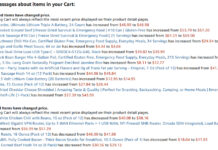
The war with China has started. Not a shooting war, but an economic one. Sure, the headlines call it a “trade war,” but there is far more than trade at stake here. The entire economy of China is in the crosshairs, and Xi Jinping, China’s president, has to be careful he does not become a casualty.
Trump set the trap and Xi fell into it. If Xi tried to compromise or negotiate, he would look weak inside China, so he pushed back. The rest of the world lined up to negotiate, making China look unreasonable. Trump then gave every other country 90 days of relief in which they can negotiate a better deal while refusing to even talk to China, pushing them further into a corner.
A corner in which Amazon, the biggest retailer in the U.S., is canceling orders of products made in China. Many other businesses are following suit, not wanting to see their costs jump 125 percent. A corner where Chinese factories are going to stop producing goods because there is no one is going to buy them when their prices double. (See video at the end of this post.)
That will mean layoffs which could cause unrest in China. The tariffs could chop a couple percentage points off China’s GNP. Their currency grow weaker, and their citizenry grow angrier if tariffs persist, so the government will look for ways to pump money into China’s economic system, using government money to buy stocks and support their capital markets. But it won’t be enough unless they break into their gold reserves. Just as the Soviet Union suffered an economic collapsed because it could not keep up with the U.S., so too might China.
Trade War with China
The trade war could sink China, or at least Xi. A trade war with the U.S. will hurt their economy far more than ours. We may have some empty shelves, closed businesses, and angry consumers, but we can make do much better than they can.
China sells us disposable plastic crap that passes for toys and housewares, while we sell them food. Which can you live without? How long will Chinese consumers tolerate the increase in the cost of beef, chicken and pork? Sure, they can hold off selling us rare earth minerals, but we can stop selling them coal, LNG and oil. The U.S. can also interfere with their ability to buy oil from the Middle East. In fact, the war with Iran could do that. Is that happenstance, coincidence, or a slick plan?
During the pandemic, everything shut down. We weren’t getting imports from the rest of the world. Truckers were sidelined, and ocean freight slowed. (Remember all the parked ships?) This time around, it looks like we may reach a deal with many of our other suppliers, leaving China out in the cold.
Trump may end up beating Xi without firing a shot. Alternatively, he might force Xi to start a war to distract his populace and generate patriotism. We’ll have to wait and see what happens. Until then, play it smart and don’t travel to Taiwan or China.
Who Needs China?
As the tariffs escalated back and forth, I said to my wife, “Are you sure there isn’t anything else made in China you need to buy before it is too late?”
“I can’t think of anything,” she said.
“What about your Oboz hiking boots? Didn’t you say you want a new pair?” I googled it, and their boots are made in China. She cringed because buying those shoes means a 90 minute drive to the store.
Meanwhile, it looks like preppers aren’t the only consumers who are stocking up. Bloomberg reported “Apple customer dash to stores to buy iPhones ahead of tariffs.” Zero Hedge says PC shipments in the first quarter jumped the most in year as customers bought laptops from market leaders like Apple, HP and Dell at a record pace.
I logged into Amazon and reviewed all my purchases since January 2024. Many items were one-offs that we will hopefully never need to buy in the next few years, like an icemaker for our refrigerator to replace the model that stopped working or a computer monitor to replace one that failed. Most of the items made in China were electronics, from computer components to cameras and batteries. Nothing jumped out at me because most of what we bought was things we want, not things we need. I guess a side benefit of being prepped is it helps us withstand a trade war.
Eventually we’ll need things made in China, or we’ll need to create conditions that shift their manufacturing to North America or more friendly parts of Asia, like Vietnam and Indonesia. Expect disruption and chaos, but keep in mind Trump is creating it for a reason, and at some point it will end.
Video of the Day
This video includes English translations of videos posted on social media in China showing goods piling up and plants closing down because of tariffs. It shows how the economic war will hurt China faster and more deeply than the U.S.






